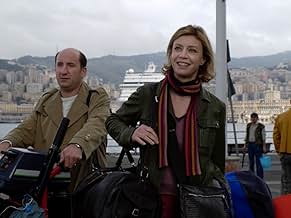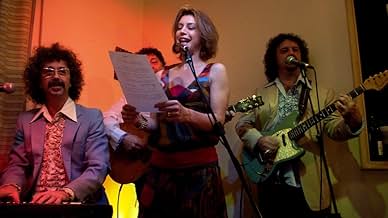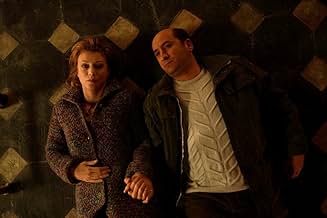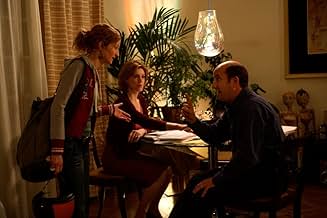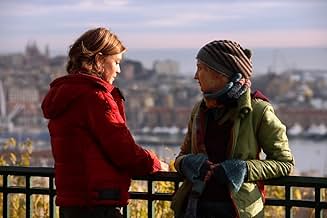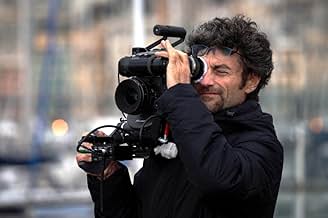Ajouter une intrigue dans votre langueA well-off and sophisticated couple struggles to stay together after the husband loses his job.A well-off and sophisticated couple struggles to stay together after the husband loses his job.A well-off and sophisticated couple struggles to stay together after the husband loses his job.
- Récompenses
- 6 victoires et 35 nominations au total
Histoire
Le saviez-vous
- AnecdotesOrietta Notari's debut.
- Bandes originalesSono Tremendo
Written by Giosy Capuano (as G.Capuano), Mario Capuano (as M.Capuano) and Danilo Ciotti (as A.D.Ciotti)
© Edizioni Chappell, S.r.l. / Fonit Cetra Music Publishing, S.r.l.
Performed by Pivio & Tuscolano Brothers
Courtesy of Warner-Chappell Music (Italiana), S.r.l.
Commentaire à la une
Days and Clouds (2007)
Tender, true, and rather moving without being the slightest bit sentimental. This is a look at normal life, in a way, in modern Northern Italy (the setting is Genoa). A fairly comfortable middle aged couple is going through a crisis as one loses a job and the money crunch adds to other everyday stresses.
And that's it. Which is a lot when you realize that that's it. There will be no murder or shocking accidents, no illness or surprise turn of events of any kind, really. Which is why it draws you further and further, gently, with more humor than pathos, until you really believe these people, or these kind of people, exist quite like this. It's not a random slice of life, since there is certainly a core problem being scrutinized (the loss of a job in mid-life, etc.). But in many ways the little events are so "little" in the cinematic sense they are just a small pageant for the viewer.
So what makes it sing beyond the compelling, restrained story is the acting, above all the acting. The couple, the husband and wife facing the crisis, makes sense because the woman (Margherita Buy) and the man (Antonio Albanese) are so perfect at being imperfect. They don't push their crisis too hard, nor do that have the ideal love at the beginning. What they show is the normal troubled tenderness and awkward anger of getting into such a situation.
Besides a second thread following somewhat their daughter's life, which has taken a less materialistic turn then the parents, the movie adds a whole other element throughout--early Renaissance art. The mother happens to have just finished (belatedly) her graduate degree in Italian art from the 1400s. And she is helping restore an obscure small ceiling painting somewhere else in town, seeing it gradually reveal itself as the movie progresses. The reason this matters is it adds an element of beauty and idealism that is implied by the whole rest of the movie. That we (all of us) are not simply here to make ends meet and worry about money. And this something bigger (call it art, call it something spiritual inspired by art or inspiring art) is what holds us up at times.
So by the end the two aspects--the mundane and the ethereal--meld, every so softly. Quite beautiful.
Tender, true, and rather moving without being the slightest bit sentimental. This is a look at normal life, in a way, in modern Northern Italy (the setting is Genoa). A fairly comfortable middle aged couple is going through a crisis as one loses a job and the money crunch adds to other everyday stresses.
And that's it. Which is a lot when you realize that that's it. There will be no murder or shocking accidents, no illness or surprise turn of events of any kind, really. Which is why it draws you further and further, gently, with more humor than pathos, until you really believe these people, or these kind of people, exist quite like this. It's not a random slice of life, since there is certainly a core problem being scrutinized (the loss of a job in mid-life, etc.). But in many ways the little events are so "little" in the cinematic sense they are just a small pageant for the viewer.
So what makes it sing beyond the compelling, restrained story is the acting, above all the acting. The couple, the husband and wife facing the crisis, makes sense because the woman (Margherita Buy) and the man (Antonio Albanese) are so perfect at being imperfect. They don't push their crisis too hard, nor do that have the ideal love at the beginning. What they show is the normal troubled tenderness and awkward anger of getting into such a situation.
Besides a second thread following somewhat their daughter's life, which has taken a less materialistic turn then the parents, the movie adds a whole other element throughout--early Renaissance art. The mother happens to have just finished (belatedly) her graduate degree in Italian art from the 1400s. And she is helping restore an obscure small ceiling painting somewhere else in town, seeing it gradually reveal itself as the movie progresses. The reason this matters is it adds an element of beauty and idealism that is implied by the whole rest of the movie. That we (all of us) are not simply here to make ends meet and worry about money. And this something bigger (call it art, call it something spiritual inspired by art or inspiring art) is what holds us up at times.
So by the end the two aspects--the mundane and the ethereal--meld, every so softly. Quite beautiful.
- secondtake
- 23 juil. 2013
- Permalien
Meilleurs choix
Connectez-vous pour évaluer et suivre la liste de favoris afin de recevoir des recommandations personnalisées
Détails
Box-office
- Budget
- 300 000 € (estimé)
- Montant brut aux États-Unis et au Canada
- 112 102 $US
- Week-end de sortie aux États-Unis et au Canada
- 16 707 $US
- 13 juil. 2008
- Montant brut mondial
- 6 966 224 $US
- Durée1 heure 58 minutes
- Couleur
- Mixage
- Rapport de forme
- 1.85 : 1
Contribuer à cette page
Suggérer une modification ou ajouter du contenu manquant

Lacune principale
By what name was Giorni e nuvole (2007) officially released in India in English?
Répondre

